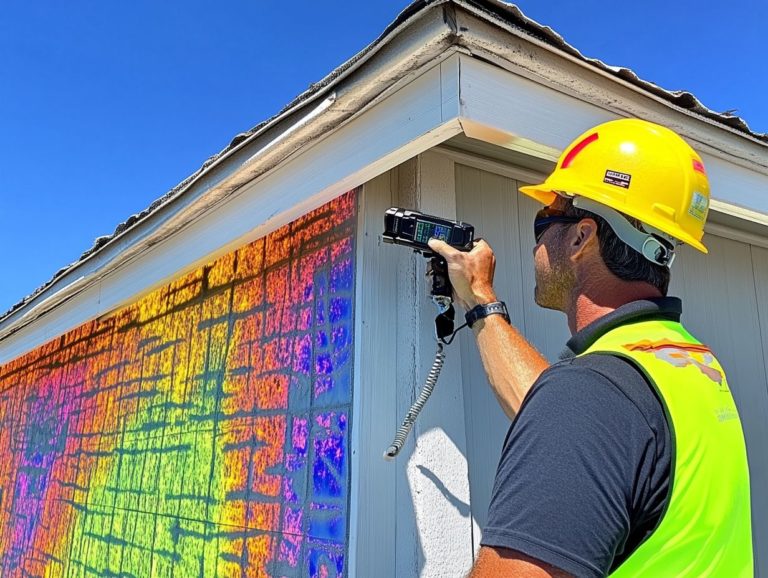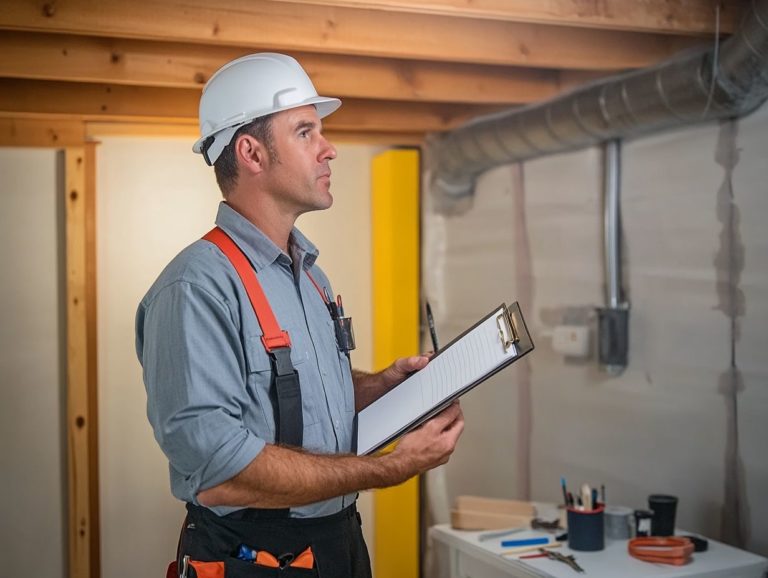The Benefits of a Home Inspection Before Selling
Selling a home can feel overwhelming, and one vital step that often slips through the cracks is the home inspection.
Understanding what a home inspection involves and why it matters can significantly enhance your selling experience. A pre-sale inspection helps identify potential issues and boosts your negotiation leverage, equipping you for a more seamless transaction.
This article delves into the definition and purpose of home inspections, what you can expect during the process, common issues that might arise, tips for preparation, and how to effectively use the inspection report as a powerful tool in your selling strategy.
Contents
- Key Takeaways:
- What is a Home Inspection?
- Why is a Home Inspection Important Before Selling?
- What Happens During a Home Inspection?
- Common Issues Found During a Home Inspection
- How to Prepare for a Home Inspection
- Using the Home Inspection Report in the Selling Process
- Frequently Asked Questions
- What are the benefits of getting a home inspection before selling my house?
- How can a home inspection save me money in the long run?
- Do I still need a home inspection if my house is relatively new?
- Can I use the home inspection report to negotiate with potential buyers?
- How much does a home inspection typically cost?
- Do I have to be present for the home inspection?
Key Takeaways:
- A home inspection is a thorough evaluation of a property’s condition, structure, and systems before it is put on the market.
- Identifying potential issues allows sellers to make repairs or disclose them to potential buyers.
- During an inspection, the inspector assesses the property’s overall condition and provides a report that can be used in negotiations with potential buyers.

What is a Home Inspection?
A home inspection is a detailed check of a property’s condition, performed by qualified experts such as Spectora inspectors and WIN Home Inspection.
This process uncovers potential issues that could impact market value, especially before a sale.
During the inspection, critical systems like electrical, plumbing, heating, and cooling are thoroughly assessed. The goal is to provide buyers and sellers with a clear understanding of the property’s structure and stability, ensuring informed decisions in real estate.
Definition and Purpose
The essence of a home inspection is a thorough examination of a property’s condition, aimed at giving buyers a clear understanding of its overall state.
This assessment highlights both visible issues and hidden defects that could pose safety risks or lead to costly repairs later.
Engaging in this essential process is crucial for both buyers and sellers, as it ensures that significant problems are uncovered before finalizing the transaction, fostering transparency and trust.
For buyers, understanding potential repair costs is vital for making informed decisions. Sellers can enhance their property’s appeal by addressing concerns early.
Why is a Home Inspection Important Before Selling?
A home inspection is essential before selling; it builds credibility and fosters trust with potential buyers, highlighting the value of home inspections for home sellers.
This proactive step ensures that your selling process is streamlined and efficient, especially in a competitive market.
Benefits for Sellers
Home inspections provide numerous advantages, understanding the benefits of home inspections establishes transparency and fosters trust with buyers, which is crucial in a competitive market.
A comprehensive evaluation lets you find necessary repairs that might otherwise be overlooked, ensuring any issues are addressed before listing your property.
This strategy serves as a powerful negotiation tool, allowing you to propose price reductions based on inspection results, ultimately enhancing your property’s appeal.
A well-documented inspection report can streamline your selling process, instilling confidence in buyers and enhancing your selling strategy. For sellers, understanding the home inspection process is crucial, especially in an environment where informed decisions lead to quicker sales.
What Happens During a Home Inspection?

During a home inspection, you can expect a detailed check of the property. This includes a comprehensive assessment of systems, structures, and any potential issues, all conducted within a defined timeline.
Every aspect of the home is scrutinized for safety and functionality.
Act now to boost your selling strategy! Schedule your home inspection today to understand the role of home inspections in home sales and ensure a smooth and successful sale!
Process and Timeline
The home inspection process typically involves a thorough examination that can take several hours, ending with a detailed report on the property’s condition.
During this time, professionals will assess everything from the roof’s integrity to the plumbing and electrical systems. Expect to accompany the inspector throughout the walkthrough, asking questions and noting any areas of concern that might arise.
Once the evaluation is complete, a detailed report is generated, usually within 24 to 48 hours. This document presents findings in clear language, often accompanied by photographic evidence, making it much easier for you to grasp any potential issues.
With this valuable information in hand, you can negotiate necessary repairs or adjustments to the purchase price, ensuring you make well-informed decisions about your investment.
Common Issues Found During a Home Inspection
During a home inspection, you may encounter a variety of issues. Some may be minor repairs that can be easily addressed.
Others could present significant problems that seriously affect the property’s overall condition and may even pose safety hazards for future occupants.
Identifying and Addressing Problems
Identifying and addressing issues during a home inspection is essential. By doing so, you can tackle necessary repairs ahead of time, significantly improving your property’s condition.
When you take the initiative to resolve any problems highlighted in the inspection, you re showcasing your commitment to the property s integrity. This proactive approach boosts buyer confidence and sets the scene for a smoother transaction.
Transparency is key; by openly sharing inspection findings with potential buyers, you foster trust. This openness is often reciprocated, making buyers more inclined to engage in negotiations.
Ultimately, this forward-thinking strategy can lead to quicker sales and, potentially, higher offers, as informed buyers typically feel more secure in their decisions.
How to Prepare for a Home Inspection
Preparing for a home inspection demands meticulous planning and a keen eye for detail. Don’t wait until the last minute! Prepare early to ensure a smooth inspection.
It’s essential for both sellers and buyers to grasp what to expect and how to navigate the inspection process smoothly.
By understanding the steps involved, you can ensure a successful and stress-free inspection experience.
Tips for a Successful Inspection

Key tips for a successful home inspection include ensuring the property is clean, addressing minor repairs beforehand, and being transparent about any known issues. Understanding the benefits of an independent home inspection can significantly enhance the inspection experience for both you, the seller, and the buyer.
To further support your efforts as a seller, consider creating a detailed record of maintenance and repairs completed on the property. This level of transparency can build trust with potential buyers and set a positive tone for negotiations.
Consider hiring a pre-inspection service to identify and resolve any hidden problems before the buyer’s inspector arrives.
On the buyer’s side, engaging actively with the inspector during the process can prove invaluable. Asking questions about findings and seeking clarification on potential issues allows you to gain a clearer understanding of the property’s condition.
It’s also wise to conduct your own research on local building codes and common inspection red flags. This knowledge gives you the power to make informed decisions as you navigate the home-buying journey.
Using the Home Inspection Report in the Selling Process
The home inspection report is an invaluable asset in the selling process, offering essential insights that empower both sellers and buyers, highlighting the importance of home inspections before buying.
With this report in hand, you can effectively negotiate repair costs and make informed decisions that significantly impact the sale.
Start preparing for your inspection today to ensure the best outcome!
Negotiating and Disclosing Findings
Negotiating and sharing insights from your home inspection report is a pivotal step that hinges on transparency and effective communication between you, the seller, and the buyer. This is your chance to make a fair deal.
You both need to approach this process with an open mind, discussing the issues laid out in the report and their implications.
As the buyer, understanding the significance of repair costs can greatly influence your decision to proceed with the sale. This might lead to requests for price reductions or repairs.
On the other hand, your strategy as the seller should involve recognizing valid concerns while also highlighting the home s strengths. This fosters a dialogue that emphasizes collaboration.
Ultimately, clear communication not only addresses immediate concerns but also builds trust, setting a solid foundation for a successful transaction.
Frequently Asked Questions
What are the benefits of getting a home inspection before selling my house?
There are several benefits to getting a home inspection before selling. First, it allows you to identify any potential issues with the house that you may not have been aware of. This gives you the opportunity to address them before putting your house on the market, potentially increasing its value. Additionally, understanding the benefits of a seller’s home inspection can help ensure that a home inspection report serves as a marketing tool, reassuring potential buyers that the house is in good condition.
How can a home inspection save me money in the long run?

By catching any problems with your house early on, a home inspection can save you money in the long run. For example, if the inspector identifies an issue with the roof that needs to be repaired, you can address it before it becomes a major and costly problem. This can potentially save you thousands of dollars in repair costs down the road.
Do I still need a home inspection if my house is relatively new?
Yes, even if your house is relatively new, a home inspection is still beneficial. It can uncover any issues that may have been missed during the construction process or identify any maintenance issues that need to be addressed. This can give you peace of mind and help you avoid potential problems in the future.
Can I use the home inspection report to negotiate with potential buyers?
Yes, the home inspection report can be a useful tool during negotiations with potential buyers. If the report identifies any major issues, you can address them before listing your house or negotiate the price accordingly. Understanding the importance of home inspections in property sales can help you avoid surprises during the negotiation process and potentially save you money.
How much does a home inspection typically cost?
The cost of a home inspection can vary depending on the size and location of your house, as well as the inspector’s experience and qualifications. On average, a home inspection can cost anywhere from $300 to $500. Keep in mind that this cost is a small investment compared to the potential savings and benefits of a thorough inspection.
Do I have to be present for the home inspection?
While it is not required for you to be present during the home inspection, it is highly recommended. This allows you to ask any questions you may have and get a better understanding of the inspector’s findings. You can also provide any additional information or insight about the house that may be helpful for the inspector.
Don’t wait! A home inspection can uncover hidden issues that might cost you later. Schedule your home inspection today or contact a real estate agent for assistance!






